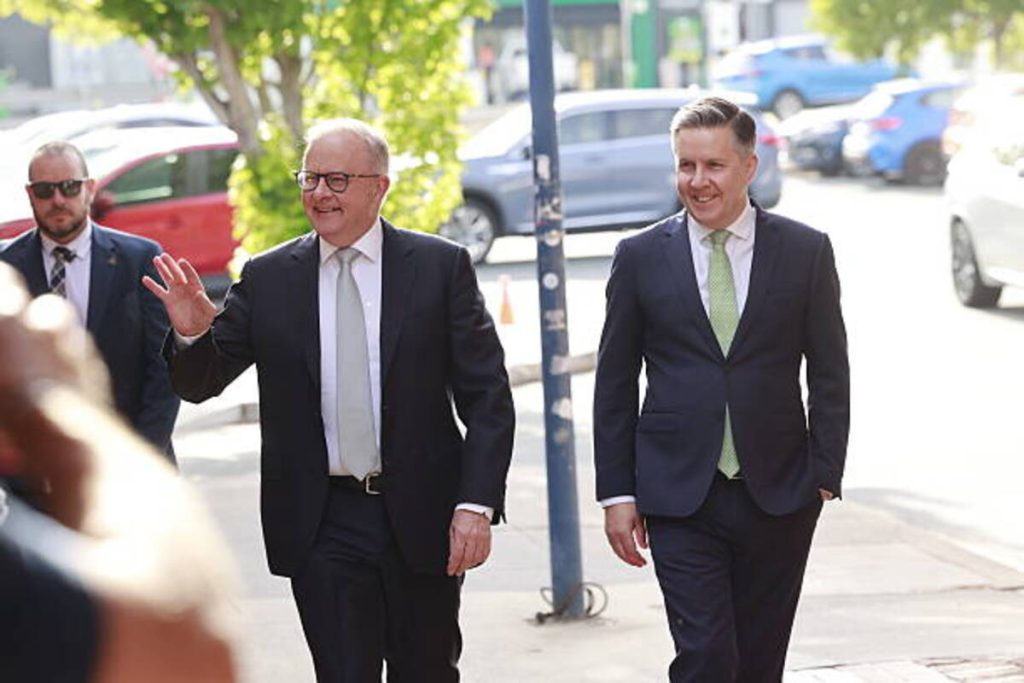
Prime Minister Anthony Albanese and Health Minister Mark Butler visit Jamison Clinic, Canberra, on November 3, 2025. Hilary Wardhaugh/Getty Images
CANBERRA, November 3 (Epicstorian News) — Australia’s federal parliament reconvened on 3 November 2025 amid rising pressure over living costs at home and growing fractures within the governing coalition over energy and climate policy.
Members returned to the chamber as inflation data and household spending reports signalled renewed economic stress for Australian families.
The government was pressed on measures to ease pressure on households, including housing affordability, energy bills and general cost increases.
Opposition figures argued that the government had been too slow in delivering targeted relief and pointed to recent committee findings on how cost pressures were affecting everyday Australians.
Households under strain as inflation bite deepens
A parliamentary inquiry tabled in recent weeks detailed areas of acute stress including transport, housing and groceries.
Government backbenchers faced questions on when further interventions would arrive and whether existing measures were adequate.
The central bank’s outlook was raised, with MPs citing that inflation surprises may delay interest-rate cuts and dampen growth.
Coalition Climate Rift Comes to the Fore
Meanwhile, the opposition parties found themselves grappling with internal dissent as the Liberal Party of Australia and its Coalition partner the National Party of Australia clashed publicly over their stance on the country’s greenhouse-gas reduction commitments.
Senator Andrew Bragg told the media at Parliament House that the Liberal Party believed the net-zero target must be retained “in some form”.
He said: “You have to have net zero in some form. I mean there’s no doubt that Australia has very serious treaty obligations. So my point is we’re a serious country, we’re a trade-exposed nation. We’re not going to walk away from international agreements. Never.”
On the domestic rules he added: “But I would say that the domestic rules have made life harder for Australians and so Labor’s net zero has been a complete disaster.”
The Nationals’ move to abandon the legislated net-zero target prompted senior Liberals to warn that without compromise the Coalition might face dissolution.
Energy and emissions under spotlight in Canberra
The policy review being led by the Liberal shadow energy minister was described as “methodical” by party insiders, but deadline-pressure was mounting.
Questions were also raised about the timing of legislation and whether the government could take advantage of the Coalition’s disarray to advance its own agenda.
Regional Security and International Posture Raised
Beyond domestic issues, parliamentarians raised Australia’s role in the region, its trade relationships and defence partnerships amid global uncertainty.
Speakers emphasised that Australia must maintain treaty obligations and remain a serious actor on the world stage even as it wrestled with economic headwinds.
Balancing global commitments and domestic priorities
Senator Bragg and other senior Liberals highlighted Australia’s status as a trade-exposed nation and urged a measured implementation of international agreements domestically.
Government ministers countered that Australia was fully committed to its international obligations and that policy design must protect both national interests and household budgets.
Committee Findings Amplify Pressure
The joint Senate committee on cost-of-living compiled extensive evidence from households, businesses and advocacy groups, identifying persistent affordability problems.
Legislators used the report’s data to press for both immediate relief and structural reforms aimed at improving productivity and supply-side resilience.
Suggestions ranged from housing policy changes, energy cost regulation, to greater oversight of essential services.
Relief or reform: where parliament focuses its energy
Some MPs argued for fast-acting relief such as subsidies or rate relief, while others said only reforms would restore long-term affordability.
During question time, several government ministers responded that multiple policy levers were already underway and that progress would be monitored closely.
This sitting week is expected to include votes on bills related to parental leave, health bulk-billing incentives and energy legislation as the government moves to deliver a packed agenda.
Related: Sydney millionaire killed in $700k speedboat crash on Parramatta River
Parties on both sides will test the waters for how they align on the twin challenges of domestic cost pressures and the global emissions transition.
With just a few parliamentary sitting weeks remaining this year, timing and momentum are crucial for all major parties.

